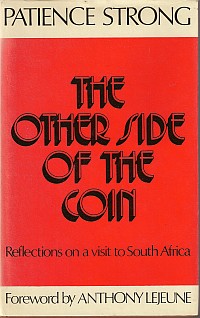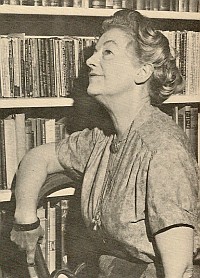 When I picked up this book recently I knew Patience Strong only as the author of queasy verses on sentimental themes to be found in my mother's favourite weekly magazine, Woman's Own. The Other Side of the Coin reveals a more disturbing side to Strong's character than could be guessed at from her clunky paeans to roses and sunsets.
When I picked up this book recently I knew Patience Strong only as the author of queasy verses on sentimental themes to be found in my mother's favourite weekly magazine, Woman's Own. The Other Side of the Coin reveals a more disturbing side to Strong's character than could be guessed at from her clunky paeans to roses and sunsets.
Her purpose here is straightforward enough, to persuade readers that criticism of the apartheid system of South Africa was misinformed. Apartheid, according to Strong (real name Winifred Emma May), was not merely better than its critics would claim but positively beneficial to the inhabitants of the country, white and black alike.
Her book falls into two halves: a description of a visit to South Africa during which she meets no one who is not charming and polite; and a more polemical second half in which she builds on her defence of apartheid by expounding political and religious ideas that are idiosyncratic at best.
Strong's first encounter with South Africa is uncomfortable, as during the sea-voyage there she developed a toothache. But with little delay after her arrival she is taken to an attentive local dentist, Dr Hotz, who not only treats her but waives the bill. She takes a rather complacent view of such good fortune:
The whole trip was a series of these little miracles as if everything had been already worked out for me by some supernatural agency, down to the smallest detail.
I could not go wrong. It was like the small bits of a jigsaw puzzle coming together to make a complete picture. But this was nothing new. From my earliest days my life has been like that and I have sometimes felt that I had no free will of my own, so wonderfully and inexplicably have things worked out when I have trusted "the current that knows its way".
Some of these little miracles may have a more earthly explanation. She tells us that the press knew of her coming and that "as soon as I arrived the telephone was ringing in my bedroom every few minutes". At this time the regime had few friends abroad and it was likely that an English writer who might be sympathetic to the cause would be treated with generosity.
 Whether that was the case or not, they had a willing gull in Strong. All the white people she meets are friendly and welcoming, while the black servants and waiters are universally "happy-looking". She unquestioningly repeats the ridiculous myth that South Africa was empty before white settlers arrived.
Whether that was the case or not, they had a willing gull in Strong. All the white people she meets are friendly and welcoming, while the black servants and waiters are universally "happy-looking". She unquestioningly repeats the ridiculous myth that South Africa was empty before white settlers arrived.
The South Africa she finds is like England with better weather, an England in its golden age before it started to go to the bad. Television, with its "vulgar and visually pornographic" programming, has not yet arrived, astonishingly, though it is on its way. Her worries that television will spoil this paradise are assuaged by a young man who reassures her that "programmes which offended against the laws of decency would not be permitted, and some sort of censorship would have to be accepted, as it should be in any civilised country." So that's all right, then.
Strong's musings range further afield. She is impressed that South Africa has a law against picking wild flowers, and wishes the same were true in her home country (it is now). She wonders what the purpose of the ostrich is, and concludes that it stands as a representation of feckless stupidity. She argues the merits of the stand-up calendar over the hanging variety.
She gives a talk to a horticultural group, who don't want to hear her talk about her garden, but rather about how England is being ruined by Harold Wilson and similar types. Before the talk a group of schoolboys perform a "minstrel show", blacked up and playing banjos. One of them gives her his hat as a gift, which she refers to with no trace of irony as her "coon's boater".
Whatever else it is, this is not great travel writing. She has a weakness for the inconsequential detail as here, for example:
The following morning was occupied with packing and conversations on the telephone. A taxi driven by a Swede took me to the boat at two thirty for we were due to sail at four.
I went into my cabin and there on the dressing table was a bouquet of pink roses left by Mr Bankey who had been to the docks at twelve, thinking I would have come aboard before lunch. I was sorry to have missed him, as I did upon my arrival. The cabin steward put my George proteas in the cool room but I decided to keep the Arthirium lilies in my cabin with the roses.
One bonus of her being so boring a writer is that fewer readers will make it to the latter part of her book, which is even more egregious an assault on reason than what precedes it. The lightly-veiled racism present throughout her travelogue becomes explicit. Absurdly, though she constantly characterises people by reference to their supposed racial origin she does not consider herself a racist, but reserves the term for those of an opposing view, who are, she says, "pro-black" and therefore "racist" against white people.
This warped view is of a piece with her espousal of the nutty creed known as British-Israelism. I have discussed that idiocy previously on this site (and been pathetically abused by one of its proponents for my trouble), but for those not acquainted with it, the core idea is that the inhabitants of the British Isles (and various other white Christian peoples) are the descendants of the Ten Lost Tribes of Israel. This idea is clearly racist, though weirdly those who are in favour of it tend not to say so.
In Strong's view, therefore, white people, especially those who happen to be British, are favoured by God. On the other hand, "the African has a simple and uncomplicated mind" and not fit to be in charge of anything important. Thus apartheid, rather than being an imperialistic and oppressive ideology, is not only sensible but in line with the teaching of poor old put-upon Jesus. Those opponents of Rhodesia and South Africa who deny these plain truths must be communistic in their inspiration.
If the South African government did have a hand in ensuring her time in South Africa was cosy and reassuring, then they will probably have been disappointed with this book. Strong sincerely attempted to defend apartheid but in doing so she made explicit the sort of loopy thinking that underpinned it. Probably not worth a dentist's bill to them; nor even a straw hat.
And what an awkward pose for
Ook. As if South African
Ian, yes, I've noticed that
Ian, yes, I've noticed that phenomenon before but never had a name for it. I will drop it into conversation (and Odd Book reviews) whenever possible.